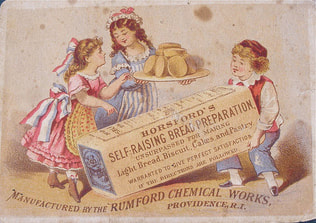|
Originally published on the Sustaining Time blog, part of an AHRC funded project which asks the question: What would be the time of a sustainable economy? Written by Alex Buchanan (University of Liverpool)  mystuart (CC BY-NC-ND 2.0) mystuart (CC BY-NC-ND 2.0) In our previous post, we described some of the changes in the baking industry following the deregulation of bread prices in the UK in 1815. In this post we wanted to outline some of the temporal dimensions specific to baking that have been revealed in our preliminary research: Night-working. Long hours worked at night were the main factor that set baking apart from other crafts. Night working was promoted both by the consumer (wanting to purchase fresh bread before work in the morning) and the supplier (the journeyman working on commission, who needed to buy the amount of flour agreed with the miller or corn factor). The introduction of the free market encouraged longer hours and during the nineteenth century, bakers might have only 4-5 hours sleep each day. Yeast - bread-making was a lengthy process, needing to take into account the cycles of rising and kneading. Until the production of dried yeast, it needed to be nurtured as a living product, in the forms of barm or ferment - which remains true of traditional sourdough bread. In 1859 the aerated bread process, which needed no yeast, was patented by Dr John Daulish, founder of The Aerated Bread Company. This reduced the length of time taken in breadmaking from around 10 hours per loaf to around 2 - but the high costs of the machinery limited its take-up. Perishability - this limited bread production to the locality and required consumers to make regular purchases. In a fascinating article on the Halifax (Canada) baking and confectionary industry, we found a quotation from an 1868 petition by the Journeyman Bakers' Friendly Society "To the Master Bakers of Halifax", which puts the workers' hours of labour into a social and moral context designed to resonate with public opinion on respectability. In a moral and intellectual point of view it is nearly as bad, as we have no time for recreation, no moral improvement; no time to spend in the social or family circle. We have no time for the public meeting, lecture, concert or religious duty; the Sun shines in vain for us, the trees and plants may grow, and the flowers may bloom, but not for us. To us the delights of the country are a sealed book; to prepare for our early toil we have to go to bed, (those that have one), while the rest of the world is awake, and work while the rest of the world asleep, thus reversing the laws of nature. No wonder that some of us have recourse to stimulants in order to give a spur to our overworked and failing nature, and for the time to bury in oblivion our degraded position.' Modern breadmaking methods have reduced the need for night working, by cooling dough down to low temperatures - its fermentation is then halted until it is warmed up again. Modern methods, including par-baking and the use of steam ovens, have even enabled bread to be transferred directly from freezer to oven. The use of frozen dough has allowed for the introduction of on-site baking and the continuous supply of fresh bread in supermarkets etc. The return to artisan baking, however, means that some of the time conflicts experiences by bakers in the 1800s are being re-visited today. We’ll explore this in our next post.
References: Burnett, J., 'The Baking Industry in the Nineteenth Century', Business History, 5/2 (1963), pp.98-108 Collins, E.J.T., 'Food adulteration and food safety in Britain in the 19th and early 20th centuries', Food Policy, 18/2 (1993), pp.95-109 Decock, P. and S. Cappelle, 'Bread technology and sourdough technology', Trends in Food Science & Technology, 16/1-3 (2005), pp.113-20 Gourvish, T.R., 'A Note on Bread Prices in London and Glasgow, 1788-1815', The Journal of Economic History, 30/4 (1970), pp.854-60 McKay, I., 'Capital and Labour in the Halifax Baking and Confectionary Industry during the last half of the Nineteenth Century', Labour/Le Travail, 3 (1978), pp.63-108 Ross, A.S.C., 'The Assize of Bread', The Economic History Review, 9/2 (1956), pp.332-42 Stern, W.M., 'The Bread Crisis in Britain, 1795-6', Economica, n.s. 31/122 (1964), pp.168-87 University of Durham, Special Collections and Archives, 'Bread through the Ages', available at http://www.dur.ac.uk/~dul0www3/asc/bread/control1.htm Webb, S. and B., 'The Assize of Bread', The Economic Journal, 14 (1904), pp.196-218 Comments are closed.
|
Archives
November 2022
Categories
All
|
 RSS Feed
RSS Feed
